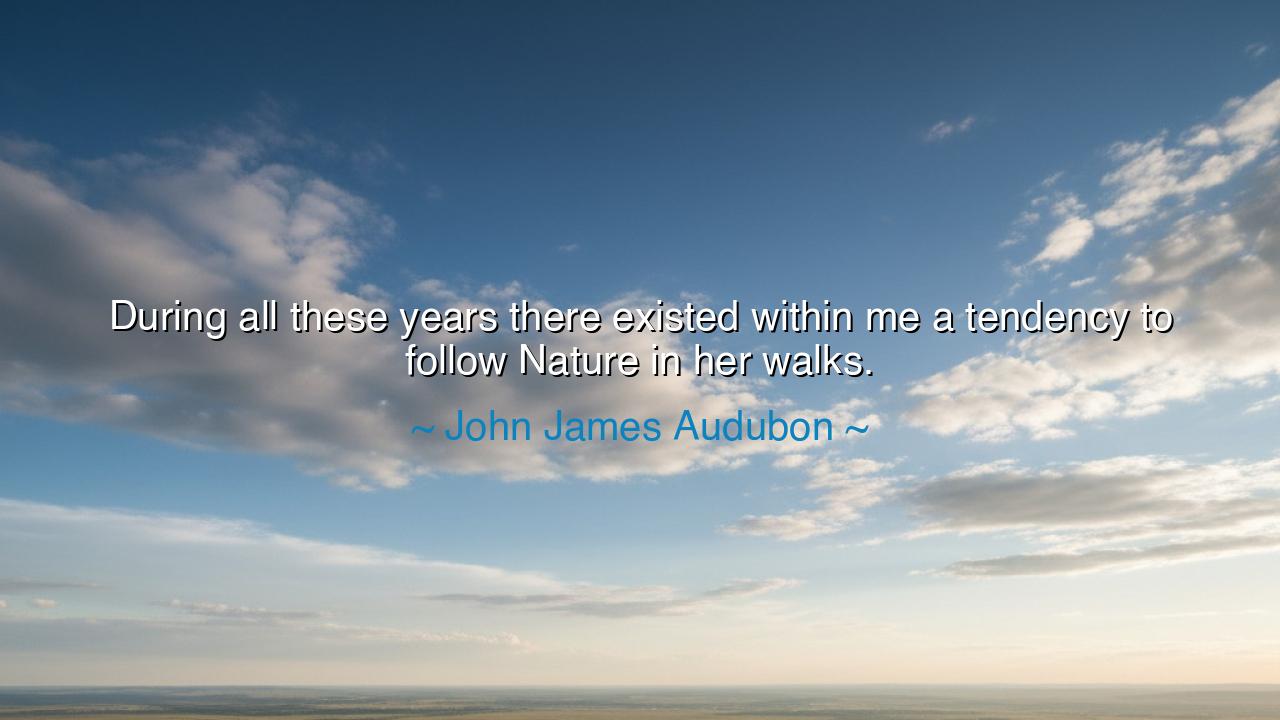
During all these years there existed within me a tendency to
During all these years there existed within me a tendency to follow Nature in her walks.






John James Audubon, the great painter of birds and prophet of the wilderness, once confessed: “During all these years there existed within me a tendency to follow Nature in her walks.” In this gentle yet powerful statement, he unveils the secret fire that guided his life. It was not the lure of cities, nor the promise of wealth, but the unshakable pull of Nature—her forests, her rivers, her skies alive with wings. His words are not merely about curiosity, but about devotion, about surrender to a greater teacher who speaks without speech and instructs without books.
The origin of this thought lies in Audubon’s lifelong passion for the wild. Born in Haiti, raised in France, and later journeying to the young America, he was restless, often failing in business, often poor, but always faithful to one pursuit: to follow Nature wherever she led him. He walked for miles through forests, endured hunger and storms, and spent countless nights beneath the stars, all to observe the creatures he loved. It was this “tendency” within him—a deep inner calling—that shaped him into the man who would one day give the world The Birds of America, a monument to both art and science.
The ancients, too, knew this sacred pull. The philosophers of Greece sought wisdom by walking in gardens and groves; the mystics of the East withdrew into mountains and rivers, learning from the rhythms of earth and sky. To “follow Nature in her walks” is to take her as one’s master. She teaches patience in the slow growth of the oak, resilience in the flight of the migrating bird, and harmony in the balance of predator and prey. Audubon’s words stand in this ancient lineage: he, too, was a disciple of Nature, learning her wisdom step by step.
History gives us luminous examples of such devotion. Think of Henry David Thoreau, who withdrew to Walden Pond to live deliberately, saying, “I went to the woods because I wished to live.” He, like Audubon, heard the call to follow Nature—to learn not from men’s systems, but from the silent teachings of the earth. Or consider Charles Darwin, who sailed on the Beagle and, in following Nature through her endless walks, discovered the hidden law of evolution. In each of these lives, the same truth resounds: Nature is the great instructor, if only man has the humility to follow.
The meaning of Audubon’s words is deeply motivational. He did not speak of grand achievements or the approval of society, but of a quiet and steady pull within the soul. To follow Nature is to remain faithful to that which calls you most deeply, even if the world does not understand. For him, this meant countless hours sketching birds and studying their movements, even when others called him foolish. Yet from that fidelity came beauty immortal. His life teaches us that to listen to the quiet voice within—the voice that calls us to truth, to beauty, to Nature—is to walk the path of destiny.
The lesson for us is clear: find the tendency within you and follow it. Do not silence the inner call, whether it leads you to forests, to art, to study, or to service. Know that Nature herself is always walking, always teaching, and that to walk with her is to find wisdom that no book alone can give. When weary of the noise of life, step outside, listen to the wind in the trees, watch the path of birds across the sky, and remember that this, too, is a sacred education.
Practically, this means making space in life for Nature’s walks. Rise early to see the dawn, linger in the quiet of woods, plant something with your own hands, and observe it grow. Keep the eyes of a student, seeing in every flower, every insect, every changing season, a hidden lesson. And above all, cultivate the patience and wonder that Audubon carried all his days, for it is these that transform the tendency into greatness.
Thus Audubon’s words endure as a hymn to devotion: “During all these years there existed within me a tendency to follow Nature in her walks.” May we, too, follow faithfully, walking beside Nature not as masters but as pupils, and in doing so, discover truths that no city, no wealth, no acclaim could ever bestow. For in her walks lie both wisdom and eternity.






AAdministratorAdministrator
Welcome, honored guests. Please leave a comment, we will respond soon